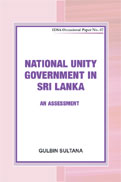National Unity Government in Sri Lanka: An Assessment
- 2017 |
- Occasional Papers
 At the close of two years, the National Unity Government (NUG) of Sri Lanka has failed to maintain the confidence and trust of the people it enjoyed during the first three months of its tenure. Having said that, political crisis or instability in Sri Lanka remains unlikely. The NUG is likely to complete its full term, but it will not be a cakewalk. The strongest points of the government, thus far, include the following: the political will of the President and the Prime Minister to continue the NUG till 2020; absolute majority in the Parliament; willingness of the Tamil parties to cooperate with the government; and the goodwill of the international community. Maintaining this status quo will be the main challenge for the government over the next three years.
At the close of two years, the National Unity Government (NUG) of Sri Lanka has failed to maintain the confidence and trust of the people it enjoyed during the first three months of its tenure. Having said that, political crisis or instability in Sri Lanka remains unlikely. The NUG is likely to complete its full term, but it will not be a cakewalk. The strongest points of the government, thus far, include the following: the political will of the President and the Prime Minister to continue the NUG till 2020; absolute majority in the Parliament; willingness of the Tamil parties to cooperate with the government; and the goodwill of the international community. Maintaining this status quo will be the main challenge for the government over the next three years.
About the Author
Gulbin Sultana is a Researcher with the South Asia Centre at the Institute for Defence Studies and Analyses (IDSA). Prior to joining IDSA, she worked with the National Maritime Foundation and the United Services Institution of India. She is a close observer of the developments in Sri Lanka and the Maldives, and has written extensively on the subjects. Some of her latest published work include: “Sri Lanka after Rajapaksa: Can it Ignore China?” (Strategic Analysis2016); “The Maldives’ Approach to Islamic Radicalism, Terrorism and Terrorist Financing” in S.D. Muni and Vivek Chadha (eds) Asian Strategic Review 2016; “Assuring Security to Sri Lanka” in S.D. Muni and Vivek Chadha (eds) Asian Strategic Review 2015; “Silver Lining in India-Sri Lanka Relations” (Indian Foreign Affairs Journal, 2015); and “An Unholy Alliance of Politics and Radical Islam in Maldives” (Aakrosh—Asian Journal on Terrorism and Internal Conflicts, 2015).
Keywords: Sri Lanka




